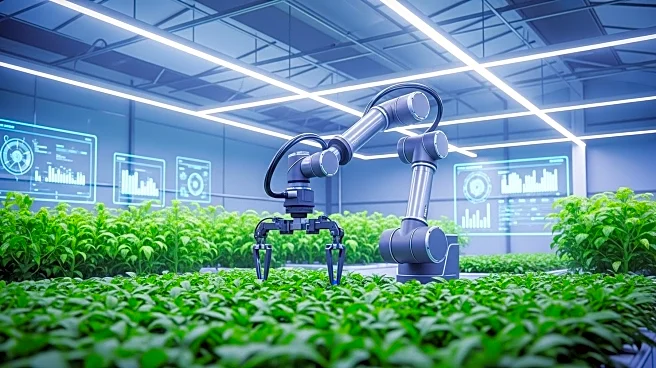What's Happening?
Artificial intelligence is increasingly becoming integral to agriculture, influencing research and development, capital planning, supply chain strategies, and investment decisions. AI is transitioning from experimental to essential, driving innovation and value creation in the agrifood sector. Key themes include the shift from randomness to prediction in R&D, the importance of data governance, the evolution from tools to systems, market-paced growth, and workforce enablement. AI is enabling startups to achieve milestones with less capital, fostering capital efficiency and allowing companies to grow in sync with industry readiness. The technology is also evolving into distributed systems that coordinate decisions across operations, enhancing efficiencies across the supply chain.
Why It's Important?
The integration of AI in agriculture is significant as it promises to enhance efficiency, reduce costs, and improve decision-making processes. For investors, AI offers shorter time-to-market, faster validation, and stronger returns on innovation pipelines. The focus on data governance highlights the need for trustworthy, shareable data, which is crucial for AI success. The shift from tools to systems suggests a future where AI autonomously manages various agricultural operations, potentially transforming the industry. Workforce enablement is critical, as AI will change how agronomists and operators work, necessitating investment in training to ensure successful adoption and competitive advantage.
What's Next?
In the coming year, AI-native agtech startups are expected to raise Series A and B funding, accelerating their path to traction. Corporate pilots will likely transition to full-scale deployments, integrating AI into standard operating procedures across R&D, logistics, and compliance. This shift may trigger significant mergers and acquisitions in ag AI, with companies competing to secure data platforms and decision-support systems. Regulatory developments concerning data privacy, model transparency, and AI accountability will require agribusinesses to stay ahead of compliance requirements to avoid delays. Companies will need to establish clear testing protocols and governance frameworks to mitigate reputational risks associated with AI outputs.
Beyond the Headlines
The adoption of AI in agriculture presents ethical and regulatory challenges, particularly concerning data privacy and labor disruption. As AI automates certain tasks, there is potential for labor displacement, necessitating retraining programs and early engagement with employees and partners. Regulatory uncertainty looms as governments set rules for AI accountability, requiring businesses to adapt to new compliance standards. Reputational risks are also a concern, as poorly validated AI outputs can erode trust with stakeholders. Companies must prioritize robust governance and testing protocols to ensure reliable AI applications.












